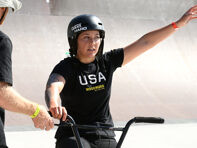The growth of OUT Central Oregon’s Winter PrideFest is nothing short of impressive. The celebratory weekend full of skiing, dance parties and rainbow flags has nearly doubled its attendance every year during its short existence. That level of success is made more special when knowing how close that increase in visibility of the LGBTQ community in central Oregon was to the event’s core.
“We approached Mt. Bachelor in November 2017 and said, ‘Hey, there’s two gay guys in Bend that ski. We’d like to have a Pride weekend up there,” said OUT Central Oregon president Jamie Nesbitt. “[Mt. Bachelor] had been wanting to do this for a while, but had no idea who in the community to contact. That began our vision of inclusivity and visibility: If Mt. Bachelor didn’t know who to contact then nobody else would.”
Nesbitt and company took that catalyst to the next level this year by holding Winter PrideFest’s first panel on LGBTQ visability in sports to kick off the festivities. The panel included trans cyclist and cycling team owner Molly Cameron, outdoor sports drag influencer and activist Wyn “Pattie Gonia” Wiley and gay strength & conditioning coach Joey Jacinto.
The diversity of the panel allowed for the discussion of many different issues facing LGBTQ athletes. Jacinto, who currently works at Redmond High School in Redmond, Ore., spoke about his own internal struggle with self-identity while fielding the pressure of being a closeted adolescent athlete. “I remember in seventh grade when I was a starter on my baseball team, and quit… I just didn’t feel comfortable,” said Jacinto. “For me, it was a very confusing time; not knowing what I was and why I was playing.”
Wiley spoke to similar experiences, pointing out how that discomfort Jacinto felt can cause LGBTQ youth to miss out on the relationships and camaraderie built by being part of a team. “[Sports] are one of the only experiences that gay men in high school get to experience teamwork… I think that it’s our job and responsibility to accept people for who they are,” said Wiley, adding,” We can have a part in encouraging people, especially if they’re queer, to take up space in sports.”
Wiley’s own hurdles came during his first experiences with drag. While the experience was personally exhilarating, his hometown community in Nebraska wasn’t as accepting. “What really stung was the distance that had been placed between me and a lot of people I thought were in my corner when I went back home,” Wiley said. That loss undoubtedly hit hard, but Wiley didn’t let it stop him from finding his true self. He donned heels on a backpacking trip six months later, setting the foundation for his successful drag persona, Pattie Gonia.
Jacinto’s discomfort in adolescence carried over into adulthood, informing his view that he couldn’t follow his passion for teaching physical education. But he overcame that internalized stigma to take a job at Redmond High School with some help from a group of very supportive co-workers. “I’ve had lots of support from the rest of the high school administration and teachers. The students are starting to gain confidence in my knowledge and my expertise… [my class] has a waiting list,” Jacinto said.
Cameron spoke to the issues facing trans athletes, connecting the issues within her specific world of cycling to the plight of trans athletes at the international level. “Trans athletes are not acknowledged and respected on the surface. It doesn’t help that the various executive bodies’
language and rules for how trans athletes can participate in sports has changed a lot, really quickly in the last few years,” lamented Cameron. “There’s been plenty of trans athletes that I have seen get into [cycling] and quickly leave because it is just too much to deal with.”
Cameron brought up the recent dismissal of former Olympian Inga Thompson from the Oregon Bicycle Racing Association (OBRA) board of directors as an example of the issues facing trans women athletes. Thompson came under heavy criticism for her suggestion of segregating trans women into their own racing category in OBRA-sanctioned events and aligning herself with transphobic organizations lobbying to exclude trans female athletes from competing alongside their cisgender counterparts.
“I think there’s kind of this national fear that trans women are going to take over women’s sport … by nature, sports are unfair. There will always be someone faster and better, but you can always strive to be better yourself,” said Cameron.

The cyclist also highlighted trans athlete Chris Mosier, who became the first trans athlete to compete as their identified gender in the U.S. Olympic Trials last month, as a positive example of how trans inclusion in sport has improved despite the hurdles placed in front of trans female athletes. “There are a lot of challenges. This year, at the 2020 Olympics, I hope that you will see trans athletes from a lot of different countries compete.”
The panel also laid out plenty of tools and strategies to aid the LGBTQ community’s fight for acceptance and visability within athletics: more comprehensive LGBTQ education in schools, repurposing hate as motivation, respecting the privacy of the individual trans experience and facilitating more open dialogue around LGBTQ presence in youth sports.
But, most importantly of all, the panel stressed positive representation and respect of the individual identities of those within the LGBTQ community. “I look forward to the time when people do have trans, gender questioning or gender non conforming people in sport that they look up to you like this is the norm and this person is well respected,” Cameron said.
“The reason why [Wiley] asked how many allies we have, how many LGBTQ people are here I think is because we often preach to the choir, right,” said Jacinto. “Let’s not be afraid to preach to the non-choir.”
Check out the entire discussion on OUT Central Oregon’s Facebook page.





































